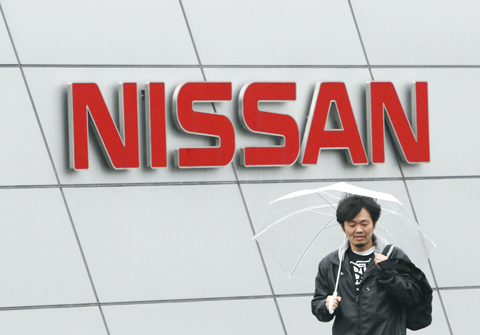French automaker Renault, Japan’s Nissan and Germany’s Daimler AG yesterday said they will form an alliance to exchange capital and technology as the industry looks to overcome the economic slump.
The deal will see the Renault-Nissan alliance take a 3.1 percent stake in Daimler while Daimler will take 3.1 percent of Renault and 3.1 percent of Nissan, the companies said. Renault-Nissan and Daimler, which makes the luxury Mercedes-Benz line and the smart small car, also agreed to work together to develop technology for small cars and engines and collaborate in making light commercial vehicles.
The partnership will “complement each other very well,” said Daimler chairman Dieter Zetsche in a statement, adding that individual brand identities would not be affected by the deal.

PHOTO: REUTERS
“We are strengthening our competitiveness in the small and compact car segment and reducing our CO² footprint — both on a long-term basis,” he said.
COMPACT CARS
The auto giants said they had agreed to develop Renault-Nissan diesel and petrol engines to be used in the new smart and Renault Twingo, to be adapted and modified with Mercedes-Benz characteristics for new premium compact cars.
The next-generation Renault Twingo, smart fortwo and a new smart four-seater will be engineered using a jointly developed architecture and will include an electric version with a launch slated for 2013, the companies said.
“This experience is extremely valuable in today’s and even more tomorrow’s global auto industry,” Carlos Ghosn, chairman and CEO of Renault-Nissan said.
The global auto industry is struggling to overcome a slump caused by the economic downturn and is joining forces to share technology and reduce costs.
German industry experts think that by cooperating with Renault, Daimler could make savings of 600 million euros (US$800 million) in its development costs.
Despite poor sales for its smart brand of mini-cars, Daimler envisions a turnaround by sharing parts with automakers that have strength in small vehicles, according to recent Japanese media reports.
SHARE PARTS
Renault, maker of the popular Clio small car, entered into an alliance with Nissan 11 years ago to share parts and open up access to production sites worldwide. The Japanese carmaker is 44.3 percent owned by Renault.
Nissan, for example, builds Renault Sandero hatchbacks at its plant in South Africa while Renault builds Nissan models in Brazil. The two carmakers have built a joint plant in India.
Renault, Nissan and Daimler had combined sales of 7.22 million vehicles last year, trailing the 8.6 million units for the alliance between Volkswagen and Japan’s Suzuki and the 7.81 million vehicles sold by Toyota.
Volkswagen, the biggest European car maker, and Suzuki finalized a cross-shareholding operation last year.

EUROPEAN TARGETS: The planned Munich center would support TSMC’s European customers to design high-performance, energy-efficient chips, an executive said Taiwan Semiconductor Manufacturing Co (TSMC, 台積電), the world’s largest contract chipmaker, yesterday said that it plans to launch a new research-and-development (R&D) center in Munich, Germany, next quarter to assist customers with chip design. TSMC Europe president Paul de Bot made the announcement during a technology symposium in Amsterdam on Tuesday, the chipmaker said. The new Munich center would be the firm’s first chip designing center in Europe, it said. The chipmaker has set up a major R&D center at its base of operations in Hsinchu and plans to create a new one in the US to provide services for major US customers,

The Ministry of Transportation and Communications yesterday said that it would redesign the written portion of the driver’s license exam to make it more rigorous. “We hope that the exam can assess drivers’ understanding of traffic rules, particularly those who take the driver’s license test for the first time. In the past, drivers only needed to cram a book of test questions to pass the written exam,” Minister of Transportation and Communications Chen Shih-kai (陳世凱) told a news conference at the Taoyuan Motor Vehicle Office. “In the future, they would not be able to pass the test unless they study traffic regulations

‘A SURVIVAL QUESTION’: US officials have been urging the opposition KMT and TPP not to block defense spending, especially the special defense budget, an official said The US plans to ramp up weapons sales to Taiwan to a level exceeding US President Donald Trump’s first term as part of an effort to deter China as it intensifies military pressure on the nation, two US officials said on condition of anonymity. If US arms sales do accelerate, it could ease worries about the extent of Trump’s commitment to Taiwan. It would also add new friction to the tense US-China relationship. The officials said they expect US approvals for weapons sales to Taiwan over the next four years to surpass those in Trump’s first term, with one of them saying

‘COMING MENACINGLY’: The CDC advised wearing a mask when visiting hospitals or long-term care centers, on public transportation and in crowded indoor venues Hospital visits for COVID-19 last week increased by 113 percent to 41,402, the Centers for Disease Control (CDC) said yesterday, as it encouraged people to wear a mask in three public settings to prevent infection. CDC Epidemic Intelligence Center Deputy Director Lee Chia-lin (李佳琳) said weekly hospital visits for COVID-19 have been increasing for seven consecutive weeks, and 102 severe COVID-19 cases and 19 deaths were confirmed last week, both the highest weekly numbers this year. CDC physician Lee Tsung-han (李宗翰) said the youngest person hospitalized due to the disease this year was reported last week, a one-month-old baby, who does not